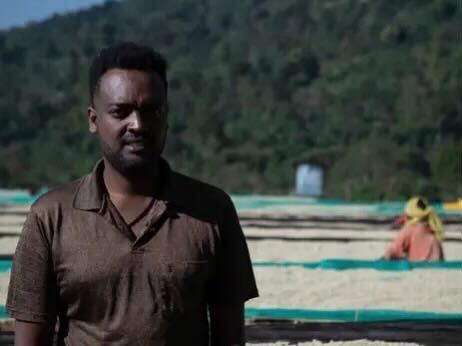
DANCHE ORGANIC / ETHIOPIA
Danche Organic / Ethiopia
Flavor Profile:
Fruit flavors of Delaware and nectarine. Flavor of jasmine tea.
Delaware, Nectarine,Jasmine tea
Country of origin: Ethiopia
Origin: Gedeo > Gedeb > Worka > Danche
Refinery: Chelbesa Washing Station
Established: 2019 Producers: Approximately 170 people Average farm size: 0.5~2ha
Variety: Dega, Wolisho
Purification method: Washed
Certification: Organic (JAS)
Altitude: 1950 -2100masl
Harvest period: 2022-2023
This is Danche's 4th year of purchase.
The Danche we released this time is a different lot of coffee that was refined at the same washing station as the previous Danche.

This year as well, we purchased coffee directly from Ethiopia with the help of our local sourcing partner, Tropiq. This is the fourth year we have been purchasing Danche.
Last year's harvest had great flavor and taste, but due to the pandemic, the selection of immature beans was a little rough. On the other hand, this year's coffee is highly uniform and gives the impression that the ripeness is more consistent. This is thought to have a lot to do with the fact that the fruit flavor is more pronounced.
I went to the site in late February of this year to make a purchase. In addition to visiting the dry mill and Tropiq laboratory and purchasing cupping, we exchanged information on coffee production in Ethiopia this year.
 Cerveza Washing Station is a new refinery facility built in 2019 in the small village of Danche. This station is certified organic in Ethiopia and is highly praised for its consideration for the surrounding environment. By the way, there are multiple facilities called Chelbesa Washing Stations in this area, but we call them Danche to distinguish them.
Cerveza Washing Station is a new refinery facility built in 2019 in the small village of Danche. This station is certified organic in Ethiopia and is highly praised for its consideration for the surrounding environment. By the way, there are multiple facilities called Chelbesa Washing Stations in this area, but we call them Danche to distinguish them.
At this washing station, only fully ripe coffee cherries are sorted and collected every day during the harvest season from 170 surrounding farmers. The farmers who supply our cherries are known for their dense semi-forest vegetation, including banana trees and shade-grown coffee trees, ensuring that their coffee is grown in a healthy, organic environment in harmony with nature. being raised.

All coffee cherries are hand-harvested and rigorously sorted again before the refining process.
The pulp is removed using a common disc pulper, and then the fruit is floated on water and separated into Grades 1, 2, 3, and 4. We only buy the highest quality Grade 1.
The depulped parchment is soaked in a tank for 72 hours to remove the mucilage along with the water through fermentation. This fermentation tank is made of ceramic, which not only gives the coffee a clear appearance, but also accelerates fermentation and improves uniformity.
It is then thoroughly cleaned in a washing channel. This process uses water and also involves sorting based on density. This traditional selection method is used in Africa, including Ethiopia. Beans with high density sink and are considered to be a high quality grade.
After that, the parchment is soaked in clean water for 2 hours. After soaking, the parchment is transferred to an African bed drying rack, spread evenly to a thickness of 2 cm, and left to dry in the sun for approximately 10 days to 2 weeks.
Once dried, the parchment is transferred to a covered warehouse where it is manually removed from defective beans over a period of 2 to 4 hours for final finishing.
[Producer information]
Environment: Semi-forest Average size: 0.5-2 hectares Soil: Fertile red soil Coffee trees per hectare: 1800-2400 Fruit yield per coffee tree: 4 kg



